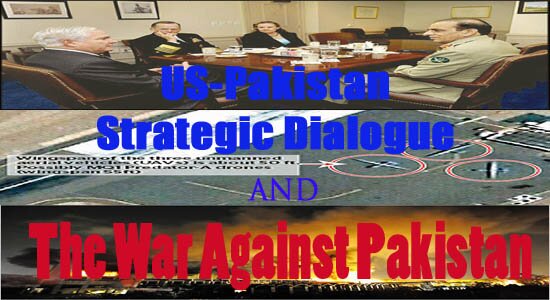
 Print This Post
Print This Post  Email This Post
Email This Post
At one point last year, Jang Group came under attack from both the Pakistani and US governments simultaneously. The list of anti-media parties is longer than commonly thought.
By AHMED QURAISHI
Wednesday, 15 September 2010.
WWW.PAKNATIONALISTS.COM
ISLAMABAD, Pakistan—The abduction and torture a couple of weeks ago of an investigative reporter for one of Pakistan’s largest English-language dailies is turning into a classical Pakistani whodunit; a mystery that competing powerbrokers in Pakistan are exploiting to pull down one another.
There are three key players in the mystery: First is the government of President Asif Ali Zardari and the civilian spy agencies that work for him; second are the military-led spy agencies; and third is the Jang Group, the parent company of The News where the abducted journalist Umar Cheema works.
Mr. Cheema was kidnapped from a public area on 3 Sept., 2010. His abductors kept him in custody for less than a day, tortured him, shaved off his head, eyebrows and moustaches, and reportedly photographed and/or video-taped him naked, for future blackmail purposes. During the ordeal, the abductors accused Mr. Cheema of working to sabotage democracy. He was released and asked to convey a message to his immediate boss, Mr. Ansar Abbasi, the head of the investigative unit at The News and a widely admired journalist. The message was simple: Back off or we’ll hurt your son.
The incident marks a new low for Pakistani politics, where intimidation and violence are an accepted part of how politics are conducted. The history of how Pakistani politicians have been treating one another is quite colorful in this regard.
There are some voices now, mostly in the media but sourced to politicians who don’t want to be named, that are pointing fingers for this disturbing incident at the country’s military-controlled spy agencies, namely the ISI and the Military Intelligence.
Considering how the Pakistani political system is teetering on the brink of collapse, with the massive failures of Pakistani democracy exposed like never before, this abduction assumes unusual significance and might become a point of reference in the future.
It is important, therefore, to understand what is at play in this case.
The elected government of President Asif Zardari did achieve one thing in its first two-and-half years: it steered clear of political victimization and hounding journalists. [Despite this record, I personally was the target of a direct attempt at intimidation by a senior aide to President Zardari in the early days of his administration in 2008. But apart from that one case, the Zardari government to its credit shunned such tactics].
But this clean record of the Zardari government has almost been rolled back. For the past several months, Mr. Zardari’s administration has been withholding advertizing money from major news organizations as an arm-twisting tactic. The Jang Group, which runs The News International newspaper, the Urdu-language Jang, and Geo News television network, was a special target because of its influence and outreach. Pakistani federal and provincial governments are the biggest advertisers and newspapers depend on this source of revenue.
After drying up the ad money, the government resorted to unusual and unprecedented attacks against key journalists who all happened to work for the Jang Group. The cat was out of the bag when no less than President Zardari himself attacked these journalists and taunted them as ‘political actors’. [These journalists are Mr. Ansar Abbasi, Dr. Shahid Masoud, Mr. Shaheen Sehbai, Mr. Hamid Mir and Mr. Kamran Khan. An online demonization campaign spearheaded by PPPP’s media managers vilified these journalists and added two more names to the list: Mr. Ahmed Quraishi and Dr. Shireen Mazari.]
Interestingly, during this time the Zardari administration appeared to be faltering, and some newspapers reported unusual movements on the part of US ambassador Anne W. Patterson to quietly shore up support for Mr. Zardari among opposition politicians. Ms. Patterson also tried to put pressure on the Jang Group to muzzle the same cast of journalists that the Zardari administration was unhappy with. The US ambassador’s approach was different. She accused the journalists without evidence of ‘endangering American lives’ because they discussed in their work US political and military meddling inside Pakistan. At one point last year, Mr. Richard Holbrooke jumped in to chastise Geo News. US officials smartly dismissed every criticism against their covert activities inside Pakistan as ‘conspiracy theories’ and have been fairly angry with the Pakistani media ever since. The overlap between the Pakistani and US governments in criticizing the Pakistani media, and especially one of its most influential outlets, the Jang Group, was an important indication of the extent of US support for the Zardari government despite recognizing its weaknesses. [On Wednesday, Sept. 15, Mr. Holbrooke tried to mend his by taking time out from his tour of flooded areas in Sindh to visit the Jang Group offices in Karachi. His effort, coming at a time when the media group is under attack, was most probably an attempt to sway Pakistan’s most influential media conglomerate, part of the overall US public diplomacy effort in Pakistan. US ambassador did the same thing during Musharraf government’s clampdown on Jang.]
A disgruntled party supporter threw a shoe at President Zardari during a public event in Britain last month and the incumbent Pakistani government quickly exploited the incident to get back at its media critics. Amazingly, the Jang Group was singled out not just for criticism but for outright terror and intimidation. Mr. Zardari’s party goons [and every Pakistani political party maintains goons for similar purposes] surrounded the company’s Karachi offices, defiled its walls with graffiti, and piled up shoes at the gate. The attack was ironic because British newspapers were nastier to Mr. Zardari in their shoe-throwing story coverage and yet no party goon from the PPPP dared do to British newspapers what they did to Jang in Pakistan.
Fast forward to Sept. 3 and the kidnap and torture of Umar Cheema.
This time, a whisper campaign is trying to pin the blame on the country’s military-led spy agencies. The supporting evidence is that the abductors were dressed as police and made it clear they were defending the government, by implication revealing the identity of their alleged sponsors. If they were sent by the government, why would they want to make this obvious? So, the conclusion goes, the abductors belong to a ‘third party’ that was trying to create a clash between the media and the ‘democratic’ government, and who else would do this except the bad old Pakistani military.
Interestingly, some politicians close to the government spent considerable time after the Cheema incident quietly trying to convince journalists that the Pakistani military is involved.
Despite the strong innuendos, the military’s media spokespeople chose to ignore the whisper campaign.
Military-led spy agencies do have a record of ‘sorting out’ journalists critical of incumbent governments, mostly before or during the 1990s. This is part of how spy agencies have been abused by successive governments by involving them in everyday politics. After all, sitting governments do influence the workings of intelligence agencies. They all report to the Prime Minister, Defense Minister and the Interior Minister in various capacities. Agents look to government officials for favorable push come promotion time.
But in Mr. Cheema’s case, the circumstantial evidence hardly supports the case of the government-linked politicians behind the ‘it-is-the-military’ whisper campaign:
-
For starters, the military is no longer meddling in Pakistani politics. If anything, key aides of President Zardari never tire of repeating how Gen. Kayani is a pillar of stability for the incumbent government.
-
Mr. Cheema’s coverage of military-related stories was forceful but hardly unique. His coverage of the scandals of the elected government is more potent. The most serious in the list of military-related investigative stories that carry his byline are the reports on the ‘missing’ persons who were kidnapped during Mr. Musharraf’s government by limited joint ISI-CIA cells. This story has been widely reported by various Pakistani media organizations and none of them has reported any pressure from the military to stop the coverage. The other interesting story that Mr. Cheema wrote, about military’s noncooperation in terror investigations, is informative news but hardly an issue that keeps military officials awake at night.
-
Just as in Mr. Cheema’s case, military-led spy agencies were accused last year of kidnapping and killing three political activists in Balochistan and again this year with the murder of another prominent political activist. In both cases, it turned out later they were eliminated by political opponents. Event the so-called ‘target killings’ in Karachi, carried out by terrorists belonging to secret armed wings of mainly two self-appointed ‘linguistic’ political parties, were blamed on the Pakistani military.
-
The bold and daring government moves to intimidate the media in the last few months, ending with the recent undeclared ban on two major television news networks Geo and ARY, leave little doubt as to the identity of those who kidnapped Mr. Cheema and made a cowardly threat against the child of Mr. Abbasi.
- Interestingly, Mr. Cheema’s most stunning piece of work – and the most dangerous in Pakistan’s context – is the story he did on how President Zardari and his close aides hired female ‘escorts’ during a visit to Istanbul and failed to pay them $8,000 in dues, forcing the girls to go to court and embarrassing the entire Pakistani government.
If the military-led agents roughed up Mr. Cheema, this is the government’s chance to get back at the powerful military. But it won’t.
The real story here is how Mr. Zardari’s government record has been stained by these anti-media measures, which, in the history of Pakistani governments, usually mean the government is insecure. It also marks the beginning of the end for the sitting government.
© 2007-2010. All rights reserved. PakNationalists.com
Verbatim copying and distribution of this entire article is permitted in any medium
without royalty provided this notice is preserved.







Leave a Reply